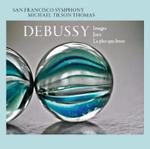|
Back
10/21/2016
“Debussy”
Claude Debussy: Images pour orchestre, L. 122 [Set III] – Jeux, L. 126 – La Plus que lente, L. 121
San Francisco Symphony, Michael Tilson Thomas (Conductor)
Live recording: Davies Symphony Hall, San Francisco, California (January 10-13 and September 26-28, 2013, May 22-25, 2014) – 60’ 21
San Francisco Symphony Media # SFS 0069 (SACD) – Booklet in English, French and German

   
The illness that beset Debussy toward the end of his life may help explain why the music highlighted on this CD has such a frenetic capriciousness. Voyance non filtrée summarizes the perspicuous detail of Michael Tilson Thomas as he outlines these late works by Claude Debussy. Nothing in Mr. Tilson Thomas’ approach to Debussy is half-hearted. On the contrary, due to the wunderkind’s personal pianistic discovery within the charming Arabesque No° 1 and The Girl with the Flaxen Hair, there’s mighty energy behind the notes which the San Francisco Symphony (SFS) generates with impressive freshness.
Inside Images we find Debussy whipping up a wildly diverse discourse, a sort of musical patois that grounds the piece with characteristic dances and instruments to get his point across. We travel the European landscape by first stepping inside Gigues with its windswept Scottish imagery; the two-tiered rhythmic structuring is sharply and magically delineated by Tilson Thomas’ adroitness with somber notes that act as the plaintive anchor which emanate from the oboe d’amore.
The ensuing Ibéria immediately unfurls with a lovely, crispy introduction: the feeling of Spanish élan is instantaneously established and the pacing is spot-on. “Slow and dreamy” wrote Debussy to effectively conjur exotica inside his “Les Parfums de la nuit.” Conversely, Mr. Tilson Thomas’ tempo appears way too rushed for such musical évaporation to permeate the mind. But we return to appropriate closing arguments within “Le Matin d’un jour de fête” with its gradient snowballing of village festivities and quixotic variations and loosened boundaries. SFS’s splendid musical depiction of such complexity brings goose-bumps…a penetrating rendition. The same can be said with Mr. Tilson Thomas’ introspective outreach during Ibéria’s conclusive “Rondo de printemps.” Keenly nuanced.
Debussy’s poème dansé, Jeux, would be a credible, powerful exposition of two merging art forms using SFS’s orchestral enlightenment. There’s much to absorb in this score, and Michael Tilson Thomas doesn’t take anything for granted: strings sizzle, brass blooms, percussion percolates, woodwinds wink. One can imagine Nijinsky’s jaw-dropping magnificent scoping of this quasi-kinky story outlining two girls, a boy and a couple of balls. Iridescent and vibrant.
Returning back to the argument of tempo, La Plus que lente, has literal translation. Here we find SFS’s deliberation and respectful consideration for what Debussy was trying to accomplish. Centering this waltz is the colorful use of the cimbalom, adding distinctive Hungarian flair and aiding the languid ¾ time. Michael Tilson Thomas effectively enriches this gauzy music with his own thoughtful rubato thumbprint.
Sound on this SFS Media recording is invigorating and brilliant. Convincing and marvelously expressed.
Christie Grimstad
|